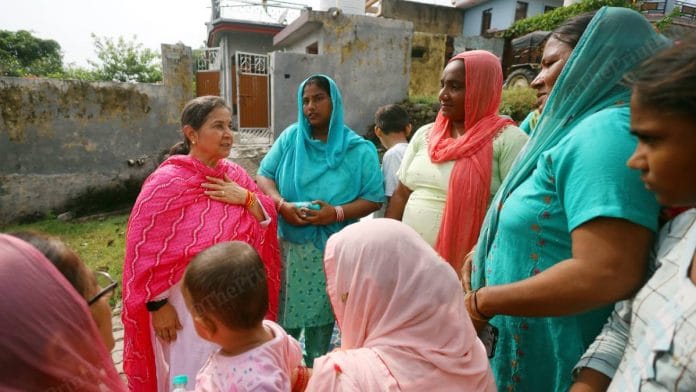Thank you dear subscribers, we are overwhelmed with your response.
Your Turn is a unique section from ThePrint featuring points of view from its subscribers. If you are a subscriber, have a point of view, please send it to us. If not, do subscribe here: https://theprint.in/subscribe/
1973 – Aruna Shanbaug
1990 – Hetal Parekh
1992 – Bhawari Devi
1996 – Priyadarshini Mattoo
2002 – Bilkis Bano
2012 – Jyoti Singh (Nirbhaya)
2017 – a 17-year-old girl in Unnao
2018 – Asifa Bano (8-year-old girl)
Jul 2018 – a 12-year-old girl in Chennai
Nov 2019 – Dr. Priyanka Reddy
Dec 2019 – 23-year-old
2020 – 19-year-old girl in Hathras
2021 – 34-year-old woman in Mumbai
2022 – UNNAMED
2023 – UNNAMED
2024 – Dr. Moumita (Abhaya)
Who are these women? In India’s language, ‘What are these women?’ These are the names that the Hon’ble Supreme Court of India has enshrined in our ‘laws’ as prohibitory to reveal due to the sensitive nature of the heinous acts that were carried out against them. Crimes that are not just heinous being women, but even more disgraceful, by any means dehumanizing.
These are among the scores of Indian women who were raped, tortured, and then in the most disgraceful manner, killed. These are only the names that surfaced amongst a bevy of nameless, faceless girls and women who face everyday persecution in India among the many across the world. What I find particularly, not just ironical, but now even more repulsive than ever before is the fact that we claim to revere and worship the Devis (Goddesses) by the day and then rip off her humanity by night, by day, and whenever we can. Crimes against women have had an astronomical rise in India. This is despite laws written and executed after landmark cases in the past. What gives, one might ask?
Sadly, India—a nation with a storied history, diverse culture, and rich traditions—has devolved into a place where women are viewed as second-class citizens, or better still, ‘citizens without a class’, both in their own homes and public areas. Women are still in danger on our streets, at work, and even in our schools. Horrible stories of violence against women, including rape and assault, are shown to us daily. However, the story that follows these heartbreaking tales is all too familiar: the obvious lack of justice. The aftermath—the lack of responsibility, the drawn-out court cases, and the startling impunity afforded to offenders—is even more heinous than the crime itself.
The Judicial System’s Failure
The statistics speak for themselves. Conviction rates in rape cases in India remain appallingly low. For every brutal case that grabs the media’s attention, countless others remain buried under the inefficiencies and corruption of the system. Trials are prolonged for years, often dragging victims through endless cross-examinations that feel like second victimization. Many women drop their cases not because they are guilty of false allegations, but because the legal process itself becomes unbearable.
Where is the Executive?
The executive branch of the government is just as unresponsive as our judiciary. Although policies are developed and promises are made, not many changes occur on the ground. Despite being the public’s first line of defense, the police frequently work together to prevent and postpone justice. As if their trauma were a bother, survivors are handled with disdain, FIRs are not filed, and evidence is tampered with. It appears that the entire system is set up to shield the offender rather than the victim.
A Nation That Fails Its Women: A Cry for Justice
India, a country with rich traditions, cultural diversity, and a proud history, has unfortunately become a land where women are treated as second-class citizens in their own homes and public spaces. Our streets, workplaces, and even educational institutions remain unsafe for women. Every day, we are confronted with horrifying accounts of rape, assault, and violence against women. Yet, what follows these heart-wrenching stories is an all-too-familiar narrative — the glaring absence of justice.
The Need for Urgent Reform
The days of modest adjustments and flimsy actions are long gone. Wide-ranging changes are required, including how the police handle sexual assault accusations, how the court handles cases quickly, and how offenders are held accountable. Accountability is necessary; it is not a choice.
This is about more than one rape case. It concerns Indian women’s collective suffering as a result of their prolonged denial of justice. Women must no longer be viewed as expendable, unseen, or secondary. We have good reason to be angry, and we are fighting for more than just justice; we are fighting for the soul of our country.
India cannot be considered a modern democracy if half of its people lack access to basic safety, dignity, and while the families of ALL women and girls continue to grapple with the realities of their changed lives thinking ‘Why did this happen to them?’, WE WAIT!!
These pieces are being published as they have been received – they have not been edited/fact-checked by ThePrint.


